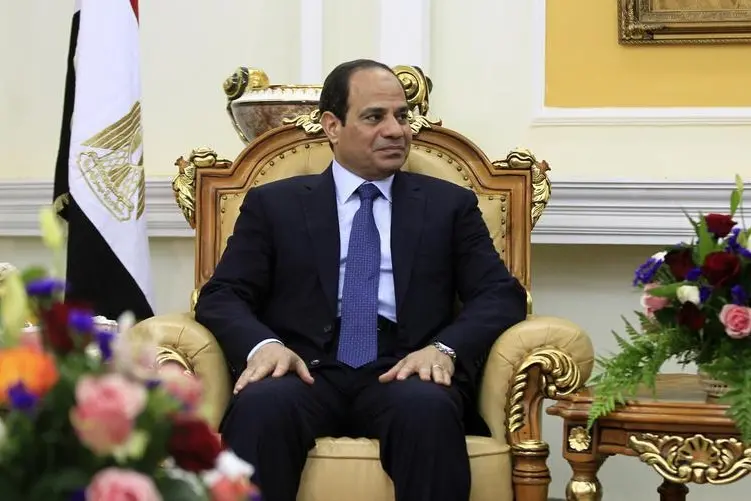PHOTO
* Top businessmen want say in policy-making
* Delicate balancing act between reforms and the generals
* Sisi has made some progress on economy after turmoil
By Eric Knecht and Asma Alsharif
CAIRO, Oct 16 (Reuters) - When Egyptian general-turned-president Abdel Fattah al-Sisi removed the unpopular Muslim Brotherhood from power in 2013, billionaire Naguib Sawiris promised to invest in his country like never before. Two years on he has no desire to spend.
As Egyptians begin voting on Sunday in parliamentary elections meant to help bring prosperity, this reluctance illustrates the strained relations between Sisi and the top businessmen who so strongly supported his rise to power.
Sisi has ruled by decree in the absence of an elected parliament, doing what successive governments were too scared to do. He has cut energy subsidies that threatened to bankrupt the state and restored some kind of economic stability after the Brotherhood's turbulent year at the helm.
But business leaders worry that the pace of reform has slowed since the president's election last year. They say Sisi seems suspicious of the private sector, instead using the military to oversee infrastructure mega-projects that his critics say will do little to spur long-term economic growth.
Sawiris said in March he would add infrastructure and energy projects to his core telecoms business, but admitted last month that none of the $500 million he pledged had yet been spent.
"We're still sitting on the same cash," he told Reuters. "As I pledged this money for Egypt it will not go out of Egypt... But I'm not a guy who will accept this slowness."
Sisi has been compared with Gamal Abdel Nasser, the army officer who overthrew the monarchy in 1952 and embarked on state projects such as the Aswan High Dam on the Nile which swelled nationalist pride but failed to build a robust economy.
Sisi built an extension to the Suez Canal in just a year and has announced ambitious plans for a new administrative capital.
While reluctant to criticise such ventures, business leaders grumble that his government has failed to deal decisively with more pressing problems, including crippling shortages of energy and foreign currency, discouraging local and foreign investors.
"The general feeling in the business community right now is that the economic vision is non-existent," Tamer Badreddine, chairman of El Badr Plastic Co, a packaging company based in the coastal city of Alexandria, told Reuters.
NEW ORDER
Businessmen complain they are no longer able to influence government policies, unlike in the past.
Life used to be cosy for Egyptian tycoons, especially under former President Hosni Mubarak, an ex-airforce chief who opened up the economy during his final decade in power.
Mubarak's son Gamal, a former investment banker, gave big business access to the upper levels of government, and was widely expected to succeed his father. But all that ended with Mubarak senior's overthrow in a 2011 popular uprising.
Gamal's rise, tainted by allegations of corruption and crony capitalism, had antagonised the generals. They wanted another military man to succeed Mubarak. After the brief period of Islamist rule, they got what they wanted in Sisi.
The military controls vast areas of the economy, overseeing roads and infrastructure construction, and producing everything from bottled water to pasta. The value of this business empire is a secret. Some estimates put it at as much as 40 percent of the economy; Sisi says it is no more than 2 percent.
Many analysts believe the threat to the military's interests led it to allow Mubarak's downfall, even though he was one of one of their own. So Sisi must tread cautiously, making reforms to win over foreign investors without alienating the generals.
"They (big business) were briefly rule makers during the time of Gamal Mubarak, but it didn't last for long," said Amr Adly, a nonresident scholar at the Carnegie Middle East Center. "You have mainly the military, the intelligence and security forces ruling the country directly and indirectly."
As they try to regain their influence, businessmen are campaigning in the polls. Like Mubarak-era officials and provincial notables, they are likely to do well under an electoral system that favours those with cash and connections.
Sawiris, who founded the Free Egyptians Party in 2011, has said his party will use its presence in parliament to hold Sisi to the economic reform pledges made when he was elected.
"Our party has an economic plan. They will push it through the parliament and any government that will not react will be accountable, finally," said Sawiris.
Sisi has made some progress on the economy. It is projected to grow 5 percent in 2015/2016, roughly the same as in 2009/2010 under Mubarak. Unemployment is 12.8 percent but has fallen a little and credit ratings agencies are generally positive on Egypt.
Still, businessmen believe Sisi needs to accelerate reforms, and they want a say in decision-making. Energy subsidy cuts, the introduction of a value-added tax and labour reforms that could trim stifling bureaucracy have faced repeated delays. Changes to the investment code have proven more modest than expected.
WEAK PARLIAMENT
Representation in parliament alone is unlikely to satisfy the business community.
"Decision making is all with the government and the business sector is very far from decision-making," said Hisham Tawfiq, former chairman of Arabia Online Brokerage Company.
To get something done, says Tawfiq, "you must convince someone who has connections to the presidency. By the time that happens, and the president is in a good mood to listen and be convinced, nothing happens".
Some businessmen expect the new lawmakers to be ineffectual. "It's really the government that will put the policies and they will just rubber stamp it," said Gamal Moharam, CEO of MGM Banking and Financial Consultants.
Sisi's government says the mega-projects aim to boost the private sector, with the military merely providing oversight. "The government will only be injecting the infrastructure portions and the rest is for private sector and international developers," Investment Minister Ashraf Salman told businessmen this week.
Sameh Seif Elyazal, a former general who knows Sisi well and heads the largest loyalist coalition running in the election, acknowledges tensions between business and the military.
But he says the army complements the private sector by accelerating the pace of major projects. "We try to reduce costs as our economy is weak and is still suffering a lot. We are talking about saving money so we can use it for other projects," he told Reuters.
"And projects that are with the army take one year (but they) take private companies two and three years. In the end it won't always be this way. That's for sure."
(Additional reporting by Ehab Farouk; Editing by Lin Noueihed, Michael Georgy and David Stamp) ((Eric.Knecht@thomsonreuters.com; +20 2 23948181; Reuters Messaging: eric.knecht@thomsonreuters.com@reuters.net))
Keywords: EGYPT SISI/BUSINESS





















